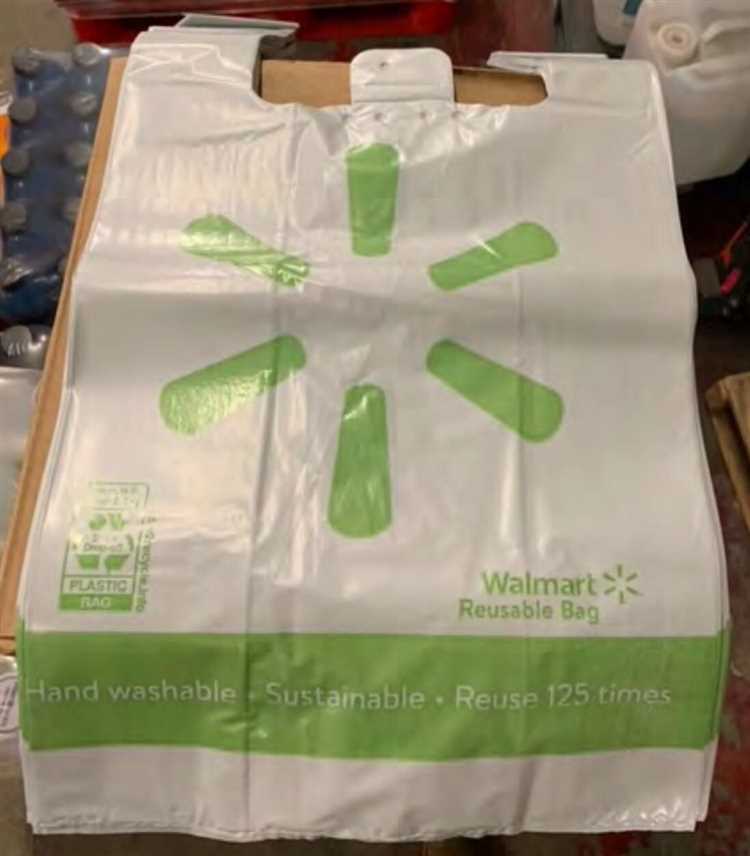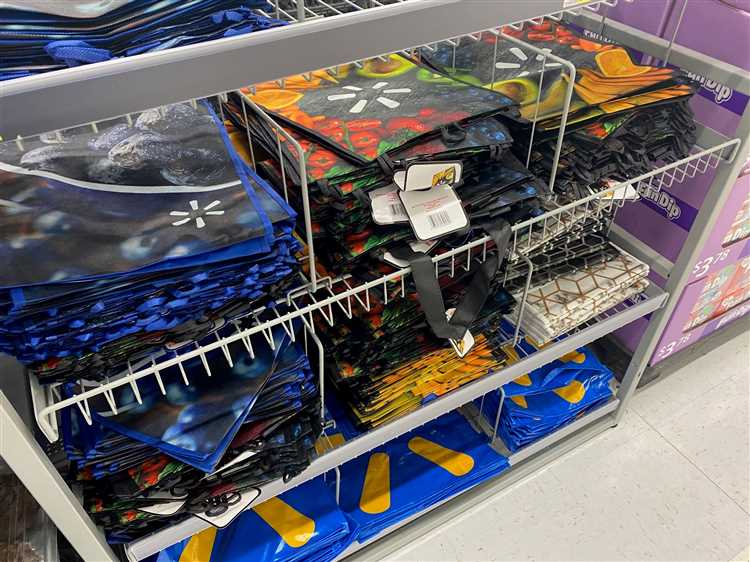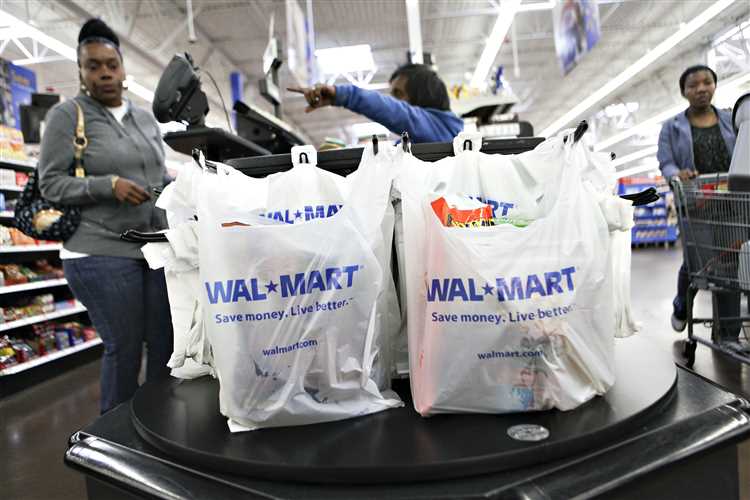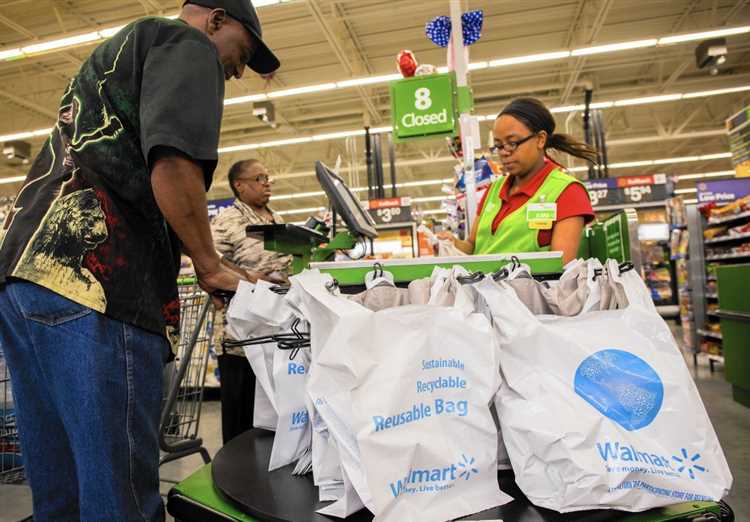
Plastic bags are a ubiquitous part of our modern lives, providing a convenient and lightweight option for carrying goods. However, the environmental impact of these bags cannot be ignored. Walmart, one of the largest retail chains in the world, is known for its extensive use of plastic bags and the subsequent implications on our planet.
Walmart, with its numerous locations and millions of customers, accumulates a staggering number of plastic bags each year. These bags are made using non-renewable resources and take hundreds of years to decompose. As they break down, they release harmful microplastics into the environment, polluting our oceans, soil, and wildlife.
The question arises: just how many plastic bags does Walmart use? The exact number is difficult to pin down, but estimates suggest that the retail giant goes through billions of bags annually. This astronomical figure only highlights the urgency of finding sustainable alternatives to single-use plastics and reducing our reliance on them.
The environmental impact of Walmart’s plastic bag usage extends beyond waste and pollution. The production and transportation of these bags contribute to greenhouse gas emissions, further exacerbating climate change. The disposal of these bags also poses a challenge, as landfill space becomes increasingly limited.
Recognizing the need for change, Walmart has taken steps to address its plastic bag usage. The company has introduced initiatives such as reusable bag incentives and partnerships with organizations focused on reducing plastic waste. However, there is still much work to be done to mitigate the negative consequences of single-use plastics on our planet.
As consumers, we also play an important role in reducing plastic bag consumption. By opting for reusable bags and supporting businesses that prioritize sustainability, we can contribute to a healthier and greener future. Together, we can work towards a world where the number of plastic bags Walmart uses is greatly reduced, and the environmental impact is minimized.
- Plastic Bags at Walmart: A Closer Look at the Environmental Impact
- The Scale of Plastic Bag Usage
- Negative Environmental Effects
- Pollution
- Emissions and Energy Consumption
- Waste Management Challenges
- The Global Plastic Pollution Crisis
- The Impacts of Plastic Pollution
- Addressing the Crisis
- Walmart’s Responsibility
- Sustainable Alternatives
- The Future of Plastic Bag Usage at Walmart
- Q&A:
- How many plastic bags does Walmart use?
- What is the environmental impact of Walmart’s plastic bags?
- Why does Walmart still use plastic bags?
- What actions is Walmart taking to reduce its use of plastic bags?
- Are there any alternatives to plastic bags that Walmart is considering?
Plastic Bags at Walmart: A Closer Look at the Environmental Impact
Walmart, being one of the largest retailers in the world, has a significant impact on the environment. One aspect of their impact comes from the use of plastic bags. These bags, commonly provided to shoppers for carrying their purchases, have been the subject of concern due to their negative effects on the environment.
Plastic bags are made from non-renewable resources such as fossil fuels, which contributes to the depletion of these precious resources. The manufacturing process of plastic bags also releases greenhouse gases, contributing to climate change.
Moreover, the disposal of plastic bags poses a major problem. Many of these bags end up in landfills, where they take hundreds of years to decompose. Not only do they occupy valuable landfill space, but they can also be carried away by the wind and end up in oceans and other natural habitats.
In the marine environment, plastic bags can have devastating effects on wildlife. Marine animals can mistake plastic bags for food, leading to entanglement or ingestion, which often leads to injury or death. The presence of plastic bags in our oceans also poses a threat to ecosystems and disrupts the natural balance.
Walmart, as a responsible corporate citizen, has recognized the need to address this issue. They have taken steps to reduce their use of plastic bags and promote the use of reusable alternatives. This includes offering reusable shopping bags to customers, as well as encouraging the use of reusable containers for produce and bulk items.
By reducing the number of plastic bags used, Walmart is helping to minimize the environmental impact associated with their business operations. This not only benefits the environment but also sends a positive message to other retailers and consumers about the importance of sustainability.
However, there is still work to be done. The use of plastic bags at Walmart, as well as in other retail establishments, continues to have a significant impact on the environment. It is important for consumers to make conscious choices and opt for reusable alternatives whenever possible.
Overall, the environmental impact of plastic bags at Walmart highlights the need for increased awareness and action to address the issue of plastic waste. By reducing our reliance on single-use plastic and adopting more sustainable practices, we can help protect our planet for future generations.
The Scale of Plastic Bag Usage

Plastic bags have become a ubiquitous feature of modern life, with countless billions used every year. These bags are used for a range of purposes, from carrying groceries to packaging products.
A study conducted by Walmart revealed the staggering scale of plastic bag usage by the retail giant. In a single year, Walmart uses an estimated 6 billion plastic bags across its stores in the United States alone.
To put this number into perspective, if these bags were placed end-to-end, they would wrap around the Earth’s equator over 30 times. This is a truly astonishing quantity of plastic waste.
The environmental impact of this level of plastic bag usage is significant. Plastic bags are not biodegradable, meaning they can persist in the environment for hundreds of years. As they break down, they release harmful microplastics that can contaminate soil and water sources.
Efforts to reduce plastic bag usage are being made, but it is clear that more needs to be done. Encouraging reusable bag alternatives, implementing plastic bag fees, and promoting recycling programs are important steps towards reducing the scale of plastic bag usage and its negative impact on the environment.
| Plastic Bag Usage by Walmart in the United States: | 6 billion bags |
|---|---|
| Total Length of Plastic Bags used by Walmart: | Over 30 times around the Earth’s equator |
Negative Environmental Effects
The extensive use of plastic bags by Walmart has significant negative environmental effects. These effects include:
-
Pollution

Plastic bags are non-biodegradable, which means they do not decompose naturally. When disposed of incorrectly, they can contaminate land, water bodies, and soil. The pollution caused by plastic bags can have detrimental effects on ecosystems and wildlife. Animals often mistake plastic bags for food and can choke or suffocate on them.
-
Emissions and Energy Consumption
The production and transportation of plastic bags result in greenhouse gas emissions, contributing to climate change. Additionally, the manufacturing process requires the use of fossil fuels, further depleting non-renewable resources. The energy consumed during the production and disposal of plastic bags is both significant and unnecessary, considering there are more sustainable alternatives available.
-
Waste Management Challenges
The sheer volume of plastic bags used by Walmart and other retailers presents challenges in waste management. Plastic bags often end up in landfills or as litter, requiring significant efforts and resources to collect and dispose of them properly. Furthermore, recycling plastic bags is a complex process that is not widely available or accessible. As a result, many plastic bags continue to accumulate in the environment, exacerbating the problem further.
It is essential for Walmart and other companies to take responsibility for their environmental impact and explore alternatives to plastic bags that are more sustainable and less harmful to the planet.
The Global Plastic Pollution Crisis
Plastic pollution has become a global crisis, threatening the health of our planet and its inhabitants. With the world’s population continuing to grow, the demand for plastic products has skyrocketed, leading to an exponential increase in plastic waste.
Plastic is a versatile material that can be found in almost every aspect of our daily lives. From packaging materials and single-use items to durable goods, plastic is used extensively across industries and sectors. Unfortunately, the convenience and affordability of plastic have come at a great cost to the environment.
The Impacts of Plastic Pollution

Plastic pollution has devastating effects on ecosystems, wildlife, and human health. When plastic waste is not properly disposed of or recycled, it often ends up in oceans, rivers, and landfills. This leads to a range of harmful consequences.
- Ocean Pollution: It is estimated that there are over 150 million metric tons of plastic in the world’s oceans. Marine animals frequently mistake plastic debris for food and can become entangled in or suffocated by it. This not only harms individual animals, but also disrupts entire ecosystems.
- Land and Soil Contamination: When plastic waste is disposed of in landfills, it can contaminate the surrounding soil and groundwater. This poses risks to both human health and agricultural productivity.
- Air Pollution: The production and incineration of plastic releases toxic chemicals into the air, contributing to air pollution and climate change.
Addressing the Crisis
Addressing the global plastic pollution crisis requires a multifaceted approach, involving individuals, corporations, and governments. Here are some steps that can be taken to reduce plastic pollution:
- Reduce, Reuse, Recycle: Encouraging individuals to reduce their plastic consumption, reuse plastic products where possible, and recycle plastic waste is crucial.
- Promote Alternatives: Developing and promoting alternative materials to plastic can help reduce the demand for plastic products.
- Legislation and Regulation: Governments can play a significant role in addressing plastic pollution by implementing regulations, levies, and bans on single-use plastics.
- Educational Campaigns: Raising awareness about the environmental impacts of plastic pollution and the importance of responsible plastic use can help drive behavioral change.
By taking collective action and implementing sustainable practices, we can work towards mitigating the global plastic pollution crisis and creating a cleaner and healthier planet for future generations.
Walmart’s Responsibility

As one of the largest retail corporations in the world, Walmart has a significant responsibility when it comes to its environmental impact. The company’s decision to reduce the number of single-use plastic bags used in its stores is a step in the right direction.
By taking action to reduce plastic bag usage, Walmart is recognizing its role in addressing the global plastic pollution crisis. The company understands that plastic bags contribute to the pollution of land, waterways, and oceans, and they can take hundreds of years to decompose.
Walmart has not only committed to reducing plastic bag usage but also to finding more sustainable alternatives. By encouraging customers to bring their own reusable bags and offering affordable options for purchase, Walmart is making it easier for consumers to make eco-friendly choices.
Additionally, Walmart has made investments in recycling infrastructure and has programs in place to encourage recycling among its customers. This demonstrates their commitment to responsible waste management and a circular economy.
While Walmart has made progress in reducing its environmental impact, it is important for the company to continue its efforts and explore more sustainable practices. This could include further reducing plastic packaging, investing in alternative materials, and collaborating with suppliers to find innovative solutions.
Overall, Walmart has a responsibility to address its environmental impact and take steps to reduce plastic bag usage. By doing so, the company is showing its commitment to sustainability and setting an example for other retailers to follow.
Sustainable Alternatives
As the environmental impact of plastic bags becomes more apparent, it is important for consumers to consider sustainable alternatives. Fortunately, there are several options available that can help reduce plastic waste and promote a greener future.
- Reusable Bags: Investing in reusable bags is an effective way to minimize plastic bag usage. These bags are typically made from durable materials such as canvas or recycled materials, and can be used multiple times.
- Paper Bags: While not as durable as reusable bags, paper bags are an eco-friendly option. They are biodegradable and can be easily recycled, making them a good choice for those who prefer a disposable alternative.
- Biodegradable Bags: Biodegradable bags are designed to break down naturally over time, reducing the impact on the environment. These bags are typically made from plant-based materials such as cornstarch, and can be a suitable alternative for those who still prefer the convenience of single-use bags.
- Mesh Produce Bags: When it comes to grocery shopping, using mesh produce bags can be a sustainable option. These bags are lightweight, washable, and reusable, making them ideal for carrying fruits and vegetables without the need for plastic produce bags.
- Compostable Bags: Compostable bags are another eco-friendly alternative. These bags are made from materials that can be broken down into compost, providing nutrients for the soil. They are a great choice for those who have access to composting facilities.
By choosing one or more of these sustainable alternatives, consumers can play a part in reducing plastic waste and protecting the environment. It is important for individuals to make conscious decisions and adopt greener practices to create a more sustainable future for generations to come.
The Future of Plastic Bag Usage at Walmart
The impact of plastic bag usage on the environment has become a growing concern worldwide. As one of the largest retail chains in the world, Walmart recognizes the need to address this issue and take significant steps towards reducing the use of plastic bags in its stores.
Walmart has already implemented various initiatives to promote sustainability and reduce plastic waste. This includes offering reusable bags for customers and encouraging the use of alternative packaging materials.
Looking ahead, Walmart aims to further minimize plastic bag usage by expanding its reusable bag program and encouraging customers to bring their own bags. This will not only help reduce the number of plastic bags used but also promote a culture of sustainability among shoppers.
In addition, Walmart is actively exploring innovative solutions to reduce its environmental impact. This includes partnering with suppliers to develop new packaging materials that are more eco-friendly and exploring the use of biodegradable or compostable bags as alternatives to plastic.
Furthermore, Walmart is committed to educating its customers about the importance of reducing plastic waste and the benefits of reusable bags. Through educational campaigns and awareness programs, Walmart aims to empower consumers to make informed choices and actively participate in the drive towards a more sustainable future.
In conclusion, Walmart recognizes the need for change and is actively working towards reducing plastic bag usage. By implementing various initiatives and exploring innovative solutions, the company is taking steps towards a more sustainable future, both for its business and the environment.
Q&A:
How many plastic bags does Walmart use?
Walmart uses over 20 billion plastic bags each year.
What is the environmental impact of Walmart’s plastic bags?
Walmart’s plastic bags contribute to pollution and waste in landfills. They also harm wildlife and marine animals when they end up in the oceans.
Why does Walmart still use plastic bags?
Walmart continues to use plastic bags because they are cheap and convenient. However, they are slowly transitioning to reusable bags and offering incentives for customers to make the switch.
What actions is Walmart taking to reduce its use of plastic bags?
Walmart is implementing programs to encourage the use of reusable bags, such as offering discounts to customers who bring their own bags. They are also exploring alternative packaging options and partnering with organizations to improve recycling efforts.
Are there any alternatives to plastic bags that Walmart is considering?
Yes, Walmart is exploring alternative packaging options, such as compostable bags and paper bags, as more sustainable alternatives to traditional plastic bags.